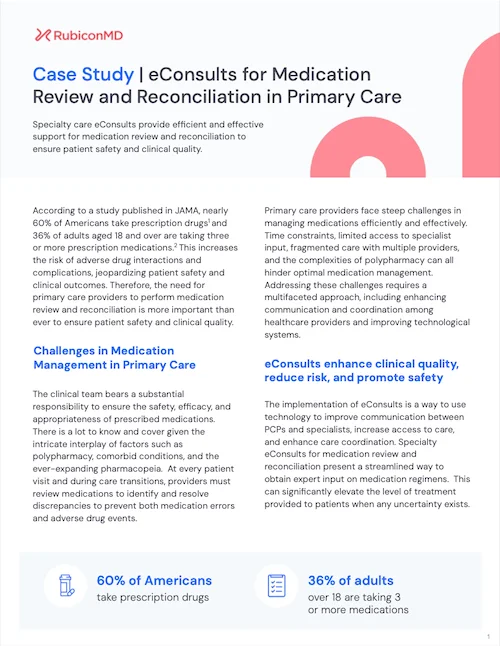Top 5 Ways eConsults Support Trauma-Informed Primary Care
In a recent RubiconMD CME webinar, “Trauma-Informed Primary Care: ACEs, PTSD, and Chronic Stress,” Ludwing Salamanca, MD, PhD of Columbia…
As our population ages, the need for high-quality, comprehensive healthcare for seniors has never been more important. 80% of older adults have at least one chronic disease, such as diabetes, arthritis, or high blood pressure, and 68% have at least two. ¹ Furthermore, when it comes to, behavioral health problems, 66% of older adults are not receiving the care they need.² The Program of All-Inclusive Care for the Elderly (PACE) is a model of care designed to meet the complex healthcare needs of seniors, providing a range of services that help them live safely and independently in their own communities.³ PACE helps to deliver more equitable healthcare to seniors by providing access to a broad range of medical and social services, including primary care, specialty care, and mental health services.
However, PACE primary care clinicians face many challenges when treating seniors with behavioral health issues:
Identifying behavioral health issues in seniors: Seniors may have different presenting symptoms of behavioral health issues compared to younger individuals. They may also have cognitive and physical impairments that impact their ability to communicate their symptoms or recognize their own symptoms. This brings an added layer of difficulty for clinicians to identify and treat behavioral health issues properly.
Comorbidities: Treating mental health conditions in seniors with multi-chronic conditions such as diabetes, hypertension, COPD and CKD is a complex challenge. Comorbidities can make it difficult to find effective treatments, increase the risk of adverse effects from medications, and make it harder to manage symptoms. Treating comorbidities alongside elderly behavioral health issues requires a coordinated, multidisciplinary approach to ensure comprehensive care is delivered.
Limited Geriatric Psychiatrists: Seniors require specialized care for their unique health issues across normal aging, psychiatric effect of acute and chronic physical illness, and biological and psychosocial aspects of older age. Because of the complex layers of late-life biological, mental and emotional disorders, geriatric psychiatrists have additional special training and experience to treat these patients. They have a deeper level of understanding for elders for topics such as multiple comorbidities tacked on with multiple medications.⁴ However, geriatric psychiatrists in the United States are spread thinly, which makes it difficult for PACE programs to provide comprehensive elder behavioral health care to seniors.⁵
Access to specialty care: The aging population often live in areas where there is a shortage of mental health professionals, making it challenging to access the care they need. Even when specialty care is available, it can be difficult to coordinate care between multiple specialists, and there are often long wait times for appointments. Also, there are transportation costs and logistics required for these patients that are in-institutions, while many PACE programs do not have the resources to provide these services in-house.⁶
A solution to enhance PACE care
Integrating virtual specialists into the PACE model of care creates the opportunity to expand the capabilities of the PCP to deliver more comprehensive and convenient care for senior patients. RubiconMD works with PACE programs and supports the missing gaps of specialty care:
Help with diagnosis, insights and second opinions
As needed, clinicians can receive insights on questions ranging from differential diagnoses to treatment options, reducing the risk of misdiagnosis or delayed treatment.
Supporting senior patients with multi-conditions and comorbidities
Clinicians are able to unlock access to 140+ specialties, inclusive of psychiatry and geriatrics, in a timely manner, while keeping the elderly patients within primary care.
Multi-chronic condition (MCC) submissions are common, and our specialists are able to provide comprehensive, integrated care plans to PACE program’s senior patients.
Being a more convenient access point for patients
Specialty eConsults often lead to an avoided referral, providing the patient with care they need right from primary care, without the added burden of travel or an additional specialist visit.
Interested in learning how RubiconMD works with PACE?
Resources:
In a recent RubiconMD CME webinar, “Trauma-Informed Primary Care: ACEs, PTSD, and Chronic Stress,” Ludwing Salamanca, MD, PhD of Columbia…
As primary care providers and health systems transition from traditional fee-for-service models to value-based care (VBC), eConsults are a scalable,…
Access to specialty care shouldn’t depend on your zip code, insurance type, or income level—but for Medicaid patients, it often…

Explore real examples of specialty care eConsults providing efficient and effective support for medication review and reconciliation.